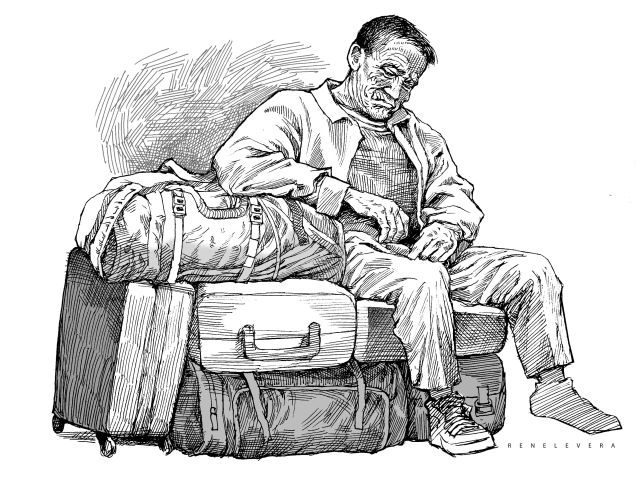I remember a time when going on a trip, particularly by boat, entailed lugging many suitcases, one or two straw mats rolled around four or five pillows and three blankets, a hamper of food, a thermos, feeding bottles and diapers for the infant. It would take a whole tartanilla or horse-drawn rig to transport them to the pier, and the same number of dockhands to carry them up to the cots on deck. (Incidentally, at the dockside in those days, hugs and tears and a promise to write preceded every departure, no matter how brief the voyage and the absence of those going away.)
To be sure, travelling heavy had its good points. The boats then had cots that could fit only the skeletal, and so joining them together and spreading a mat over them proved ingenious. The vessels, not much more than slow-moving tramps, often conked out in the middle of the ocean and remained stalled for hours—those who had brought provisions did not have to worry about starving while the mechanics endeavored to reignite the engine.
I have always favored traveling with as little baggage as possible, slinging over a shoulder a compact bag containing just a change or two. (Of course, when I travel with others, I have to make adjustments—I cannot impose my ways on those who might want their trip to have more style, and weight.)
In time we accumulate possessions. I did not realize how many bags, shoes, boxes, souvenirs, books, gadgets and bric-à-brac we had in the house until we had the rooms overhauled and we had to clear them of content. At first, I thought we would have no problem with disposal because most of these items had outlived their time and uses. But when the wife came across her college notes and the old issues of a magazine she had edited, as well as the toys we had bought for our children—chipped and fractured and mostly malfunctioning—and the vinyl records (LP albums) and the phonograph with an armless turntable, and many other articles, our throwaway plans went off awry, and we ended up keeping two-thirds of the offscourings.
In a poem, “Travelling Light,” by C. Day Lewis, the speaker—a sailor accompanying Jason on the boat Argo in his quest to find the Golden Fleece—talks about the need to travel burdenless: “What our need had forced / On us grew second nature: first / Ventures in travelling light became / Accepted ordeals, then a game / Of self-denial, sanctified / By habit or traditional pride.”
A game of self-denial—it seems that Jesus spoke of this. Luke writes that Jesus appointed 72 disciples, “whom he sent ahead of him in pairs to every town and place he intended to visit,” telling them, “The harvest is abundant but the laborers are few; so ask the master of the harvest to send out laborers for his harvest. Go on your way; behold, I am sending you like lambs among wolves.”
Jesus added, “Carry no moneybag, no sack, no sandals; and greet no one along the way.”
Whenever they entered a town, and were received, they were to “eat what is set before you, cure the sick in it and say to them, ‘The kingdom of God is at hand for you.’” If unwelcomed, they were to go out into the streets and say, ‘The dust of your town that clings to our feet, even that we shake off against you.’”
Why did Jesus admonish the disciples to travel with nothing but the shirt on the back? He saw their need for “a game of self-denial”—to strip themselves of everything except their mission. As C. Day Lewis’ poem puts it, “the thing / You voyage for is voyaging— / Purely that.”
As much with their preaching and healing, the disciples were to draw people into God’s kingdom through how they travelled — emptied of everything except the love of God, in which every moment is a time analogous to that which C. Day Lewis describes—“when horizon, heart, sky / Dilate with absolute potency— / The potency at its highest power, / The course in view, the wake in flower.”
Disclaimer: The comments uploaded on this site do not necessarily represent or reflect the views of management and owner of Cebudailynews. We reserve the right to exclude comments that we deem to be inconsistent with our editorial standards.

